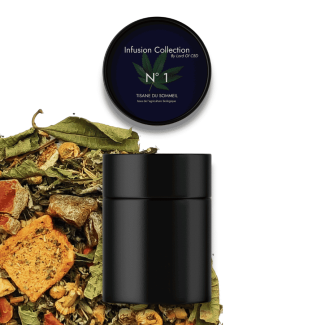
What does taking CBD cause in your body?
Taking CBD into your body has many positive effects thanks to its interactions with the endocannabinoid system. CBD works by binding to CB1 and CB2 receptors in the endocannabinoid system, which may help regulate mood, pain, appetite, sleep, and other physiological functions.
The beneficial properties of CBD include its anti-inflammatory, analgesic, anxiolytic and neuroprotective effects. It is also effective in relieving the symptoms of certain diseases such as epilepsy, anxiety, depression, chronic pain, nausea, and even neurological disorders such as Alzheimer's or Parkinson's disease.
The mechanism of action of CBD on the human body involves modulation of neurotransmitters, regulation of inflammation and the immune system, and protection of nerve cells. As a result, taking CBD can lead to symptom relief and an overall improvement in well-being.
In conclusion, taking CBD can have a positive impact on health due to its interactions with the endocannabinoid system, its beneficial properties and its effectiveness in relieving the symptoms of various diseases.
The effects of CBD on neurons
CBD, or cannabidiol, acts on neurons by exerting several beneficial effects. Its antiepileptic properties help stabilize the electrical activity of neurons, thus reducing the risk of epileptic seizures. In addition, its neuroprotective abilities help prevent damage to neurons and promote their survival.
CBD also acts on the ion channels of neurons, thereby regulating their electrical activity. Its antioxidant and anti-inflammatory properties help reduce oxidative stress and inflammation in the brain, protecting neurons from potential damage.
In the treatment of neurodegenerative diseases such as Alzheimer's or Parkinson's disease, CBD plays a potential role in slowing disease progression and preserving neuronal function.
CBD also influences messages sent between neurons by modulating the activity of neurotransmitters such as serotonin, dopamine and GABA. This can help improve mood, cognition, and cognitive function.
In conclusion, CBD exerts positive effects on neurons by providing antiepileptic, neuroprotective, antioxidant, anti-inflammatory properties and by modulating messages between neurons via key neurotransmitters.
The effects of CBD on neurotransmitters
CBD acts on neurotransmitters by mainly targeting serotonergic, dopaminergic and gabaergic receptors. It acts as a modulator by regulating the release of neurotransmitters and influencing their interaction with receptors. This interaction has a direct impact on mood, sleep, pain and the management of neurodegenerative diseases.
CBD acts positively on serotonergic receptors, helping to regulate mood and reduce symptoms of anxiety and depression. It also influences dopamine receptors, contributing to the regulation of motivation, reward and motor coordination. Additionally, CBD acts on gabaergic receptors, which may help reduce anxiety and promote sleep.
When it comes to pain and neurodegenerative diseases, CBD plays a key role in managing chronic pain and treating neuropathies by reducing inflammation and acting on pain pathways. Additionally, its neuroprotective properties make it a promising candidate for the treatment of neurodegenerative diseases such as Alzheimer's disease and Parkinson's disease.
Effects of CBD on muscles: soothing effect through the nerves
CBD, or cannabidiol, acts on the nervous system to produce a calming effect on the muscles. This natural compound works by binding to receptors in the endocannabinoid system, thereby regulating the transmission of nerve signals and modulating pain and inflammation. By acting on neurotransmitters such as serotonin, CBD helps reduce anxiety and stress, thus promoting muscle relaxation.
This beneficial effect on muscles has important implications for athletes, people suffering from muscular pathologies and stressed individuals. CBD can help reduce muscle soreness, promote faster recovery after physical exertion, and improve sleep quality, which is essential for muscle recovery.
In conclusion, CBD acts on the nervous system by modulating neurotransmitters to produce a soothing and relaxing effect on the muscles. This action can be beneficial for athletes wishing to improve their performance and for people suffering from muscular pathologies looking for natural solutions to relieve their pain.
The effects of CBD on inflammation
CBD is known for its direct and indirect anti-inflammatory effects. It works by regulating cytokines, proteins involved in the regulation of the immune response and inflammation. By limiting the production of pro-inflammatory cytokines, CBD may help reduce the symptoms of inflammatory diseases and allergies.
Additionally, CBD is also known for its calming effects on the nervous system, helping to manage stress and improve sleep quality. These benefits may also support the reduction of inflammation, since stress and lack of sleep can worsen inflammatory symptoms.
When it comes to pain, CBD may help limit pain due to its connection to inflammation. By reducing inflammation, CBD may help alleviate pain associated with inflammatory conditions such as arthritis.
Finally, CBD can also have a positive impact on the digestive system due to its anti-inflammatory and soothing properties. By regulating inflammation and stress, CBD can help maintain a healthy digestive system.
In summary, CBD offers a multi-faceted approach to reducing inflammation, by acting on cytokines, stress, pain and the digestive system.
The effects of CBD on pain
CBD is increasingly recognized for its positive effects on pain relief. It acts on pain perception by interacting with pain receptors in the brain, thereby reducing the sensation of pain. Additionally, CBD is effective in treating neuropathies, which are nerve pain that is often difficult to relieve with traditional treatments.
When it comes to daily pain management, CBD can be a natural solution for those suffering from chronic pain. It also acts as a powerful anti-inflammatory, reducing inflammation that is often associated with pain. Additionally, its interaction with the body's endocannabinoid system helps regulate pain and inflammation naturally.
Finally, CBD is also effective in relieving muscle and joint pain, making it a popular choice for athletes and active people. In summary, CBD offers a wide range of benefits to relieve different types of pain, acting on pain perception, neuropathies, inflammation and muscle and joint pain.
Antioxidant, sebum regulating and skin protective effects
CBD is recognized for its antioxidant, anti-inflammatory and sebum-regulating effects which make it an ideal ingredient for skin care. By combining CBD with hemp seed oil, its skin protective properties are enhanced, providing a dual beneficial action.
Thanks to its anti-inflammatory and antioxidant properties, CBD may benefit skin conditions such as psoriasis, eczema and adult acne. By regulating sebum production, it also helps maintain skin balance, thereby preventing skin problems like acne.
In addition, CBD promotes the recovery of damaged skin thanks to its regenerative properties. It helps soothe irritation and deeply nourish the skin, leaving it soft, supple and protected.
With its antioxidant, sebum-regulating and skin-protecting effects, CBD is a valuable ally for healthy and radiant skin. Discover our range of CBD-based products to benefit from its benefits for your skin.
Does CBD have negative effects on the heart?
CBD, unlike THC, is not bad for the heart. In fact, several studies have shown that CBD may have positive effects on heart health. It acts as a hypotensive, meaning it can help lower blood pressure. However, it is important to exercise caution when taking beta blockers because CBD may interact with these medications. It is recommended to consult a healthcare professional before combining these substances.
Generally speaking, regular use of CBD is considered safe for heart health. Importantly, CBD can help reduce stress and anxiety, which are risk factors for heart disease. In conclusion, CBD is not bad for the heart and may even have beneficial effects on heart health. However, it is essential to consult a healthcare professional before including it in your daily routine, especially if you are taking heart medications.
What CBD doesn't do
CBD does not have a psychotropic effect, meaning it does not cause feelings of euphoria or altered consciousness. Unlike THC, CBD does not activate CB1 receptors in the brain, which contributes to its lack of psychotropic effect.
Additionally, CBD is not addictive. Studies have shown that CBD users do not develop a tolerance to its effects, meaning they do not need to increase their dose to get the same relief.
Finally, CBD does not produce withdrawal syndrome when stopped after regular use. Unlike other substances, stopping CBD does not lead to withdrawal symptoms such as anxiety, insomnia, or irritability.
In summary, CBD does not cause psychotropic effects, does not activate CB1 receptors, does not lead to dependence, does not cause tolerance and does not produce withdrawal syndrome. This is a safe, non-addictive natural supplement for those looking for an alternative to traditional medications.
Keywords: psychotropic effect, CB1 receptors, dependence, tolerance, withdrawal syndrome.
The potential effects of cannabidiol are still being researched.
Cannabidiol (CBD) is a non-psychoactive compound derived from cannabis, and its potential effects are currently the subject of much research. When it comes to anxiety, preliminary studies suggest that CBD may be effective in reducing symptoms, but more research is needed to fully understand its impact on different types of anxiety. Likewise, the potential of CBD in treating withdrawal from substances, such as nicotine and alcohol, is still being studied.
CBD has also attracted growing interest in its impact on the gut microbiota, and preliminary research suggests that it may positively influence microbiota composition and function.
When it comes to chronic conditions, there is limited evidence to suggest that CBD may have beneficial effects, but additional studies are needed to fully evaluate its effectiveness.
Additionally, initial studies suggest that CBD may improve the quality of life of people at the end of life or with incurable/orphan diseases, although further research is needed to confirm these findings.
In France, current CBD regulations are evolving, with recent changes regarding its sale and use.
Therefore, although some preliminary research shows promising results, it is important to continue studies to better understand the full potential effects of CBD.
In conclusion
In conclusion, CBD offers a promising natural treatment for a variety of common health conditions. Scientific studies have shown that CBD may be effective in treating anxiety, depression, acne, heart disease, and certain types of cancer. Additionally, CBD is increasingly being used as a natural alternative to relieve pain and symptoms associated with various illnesses.
CBD research continues to uncover new potential therapeutic uses, making it an exciting compound in healthcare. It is important to note that although CBD shows promise, it is still important to consult a healthcare professional before using it to treat specific health conditions.
In summary, CBD offers many potential health benefits and continues to be studied for its many therapeutic uses. It is an interesting natural alternative to consider for those seeking non-pharmacological treatment options.
👉 A study published by the was carried out in this regard in 2019. It was carried out on 57 men who had to speak in public, to whom they were administered a dose of CBD or a placebo. It emerged that people who received CBD, and not the placebo, saw their stress significantly reduced when speaking, while the placebo recipients had almost no beneficial effect on their anxiety. National Library of Medicine
👉 A study published in the National Library of Medicine in 2017 highlighted a (form of epilepsy), who was administered CBD or a placebo. It emerged that the children who received CBD saw a reduction in their seizures, unlike those who received the placebo. Certain side effects, such as diarrhea, drowsiness, vomiting, etc. have nevertheless been observed. trial carried out on 120 children and young adults suffering from Dravet syndrome
















